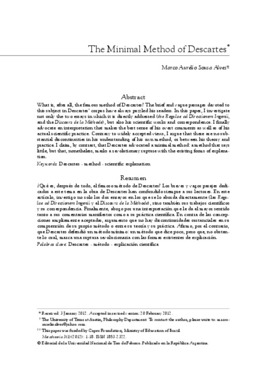The minimal method of Descartes
Abstract
What is, after all, the famous method of Descartes? The brief and vague passages devoted to this subject in Descartes’ corpus have always puzzled his readers. In this paper, I investigate not only the two essays in which it is directly addressed (the Regulae ad Directionem Ingenii, and the Discours de la Méthode), but also his scientific works and correspondence. I finally advocate an interpretation that makes the best sense of his overt comments as well as of his actual scientific practice. Contrary to widely accepted views, I argue that there are no substantial discontinuities in his understanding of his own method, or between his theory and practice. I claim, by contrast, that Descartes advocated a minimal method: a method that says little, but that, nonetheless, marks a revolutionary rupture with the existing forms of explanation. ¿Qué es, después de todo, el famoso método de Descartes? Los breves y vagos pasajes dedi-cados a este tema en la obra de Descartes han confundido siempre a sus lectores. En este artículo, investigo no solo los dos ensayos en los que se lo aborda directamente (las Regulae ad Directionem Ingenii y el Discours de la Méthode), sino también sus trabajos científicos y su correspondencia. Finalmente, abogo por una interpretación que le da el mayor sentido tanto a sus comentarios manifiestos como a su práctica científica. En contra de las concepciones ampliamente aceptadas, argumento que no hay discontinuidades sustanciales en su comprensión de su propio método o entre su teoría y su práctica. Afirmo, por el contrario, que Descartes defendió un método mínimo: un método que dice poco, pero que, no obstante lo cual, marca una ruptura revolucionaria con las formas existentes de explicación.

